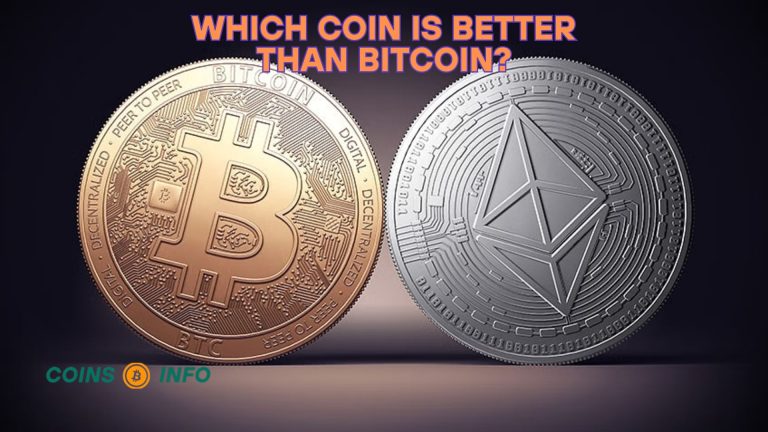Which Coin is Better than Bitcoin? Bitcoin (BTC) has been the industry chief and pioneer in the cryptocurrency space since its introduction in 2009. It has the longest history, the biggest market capitalization, and the most well-known brand. But the adjective “better” is arbitrary; it can refer to improved privacy, scalability, energy efficiency, speedier transactions, or greater smart contract capabilities.
Although Bitcoin is unparalleled in terms of security and decentralization, other coins have surfaced that perform better in particular domains.
Ethereum (ETH) – The Smart Contract Leader.
If “better” means more utility, Ethereum is the top contender.
Bitcoin’s primary role is as a store of value and medium of exchange, but Ethereum introduced smart contracts, allowing developers to create decentralized applications (dApps) that power sectors like DeFi (Decentralized Finance), NFTs (Non-Fungible Tokens), and DAOs (Decentralized Autonomous Organizations).
Why Ethereum Could Be Better:
- Smart Contracts: Enable programmable money and automation of agreements.
- Ecosystem Size: Hosts thousands of projects and tokens.
- Proof-of-Stake (PoS): After “The Merge” in 2022, Ethereum became much more energy-efficient than Bitcoin.
- Scalability Upgrades: Ethereum’s rollups and sharding aim to handle thousands of transactions per second (TPS).
Drawback:
- Less decentralized than Bitcoin.
- Still dealing with high gas fees, though Layer-2 solutions are improving this.
Solana (SOL) – Speed and Scalability Champion.
If “better” means speed and low transaction costs, Solana outperforms Bitcoin dramatically.
Bitcoin processes about 7 TPS, while Solana handles over 50,000 TPS in ideal conditions.
Why Solana Could Be Better:
- Near-Instant Settlement: Transactions finalize in seconds.
- Extremely Low Fees: A fraction of a cent per transaction.
- Growing dApp Ecosystem: Especially strong in gaming, NFTs, and DeFi.
Drawback:
- Experienced several network outages in the past.
- More centralized than Bitcoin, with fewer validators.
Cardano (ADA) – Sustainability and Peer-Reviewed Development.
If “better” means sustainability and academic rigor, Cardano is a strong choice.
It uses the Ouroboros Proof-of-Stake protocol, which is energy-efficient and backed by formal research.
Why Cardano Could Be Better:
- Eco-Friendly: Consumes far less energy than Bitcoin.
- Scientific Approach: Peer-reviewed academic research guides development.
- Focus on Real-World Use Cases: This is especially true in identity management and supply chain tracking.
Drawback:
- Slow rollout of features compared to competitors.
- Smaller ecosystem than Ethereum or Solana.
Monero (XMR) – Privacy First.
If “better” means privacy and anonymity, Monero wins over Bitcoin.
While Bitcoin transactions are public and transparent, Monero utilizes ring signatures and stealth addresses to conceal transaction details.
Why Monero Could Be Better:
- Complete Privacy: Transaction history is untraceable.
- Fungibility: All coins are identical in value because their histories are hidden.
Drawback:
- Privacy coins face more regulatory scrutiny.
- Lower adoption by mainstream businesses.
Polkadot (DOT) – Interoperability Leader.
If “better” means cross-chain connectivity, Polkadot stands out.
Bitcoin operates in isolation, but Polkadot allows different blockchains to exchange data and assets.
Why Polkadot Could Be Better:
- Interoperability: Bridges blockchains for greater functionality.
- Scalability: Uses “parachains” to increase throughput.
- Governance: On-chain voting allows stakeholders to shape the network’s future.
Drawback:
- Still building adoption compared to Ethereum.
- More complex to understand for beginners.
Litecoin (LTC) – Bitcoin’s Faster Sibling
If “better” means faster and cheaper Bitcoin transactions, Litecoin is a close alternative.
It’s often called the “silver to Bitcoin’s gold.”
Why Litecoin Could Be Better:
- Speed: Blocks are processed every 2.5 minutes vs. Bitcoin’s 10 minutes.
- Lower Fees: More affordable for small payments.
- Security: Similar PoW foundation but with the Scrypt algorithm.
Drawback:
- Lacks the same web effect and adoption as Bitcoin.
- Offers fewer innovative features compared to newer coins.
Final Thoughts.
No single coin is universally better than Bitcoin in every way. Bitcoin remains unmatched for security, decentralization, and brand recognition, making it the safest long-term store of value in crypto.
However, other coins surpass Bitcoin in specific areas:
- Ethereum for smart contracts and utility.
- Solana for speed and low fees.
- Cardano for sustainability.
- Monero for privacy.
- Polkadot for interoperability.
- Litecoin for faster payments.
In the end, “better” depends on your priorities as an investor or user. If you want digital gold, Bitcoin is king. If you want decentralized applications, Ethereum might be better. If you want instant payments, Solana could be your choice.
The key takeaway? Bitcoin may have started the revolution, but the crypto landscape now offers specialized coins that outshine it in particular areas — and diversification is often the smartest approach.
